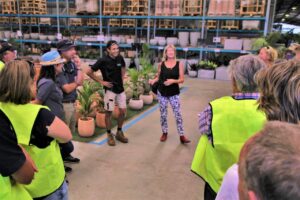Increasing your value as an employee
By Daniel Fuller
The skills that you bring to your workplace can be broken into two categories: soft and hard skills. Keeping this framework in mind can help you perform at your peak in your current role, and help you make the best impression at your next interview.
Obviously, you want to be the best employee that you can be, so you can have access to the best opportunities. These opportunities include getting promoted, getting a better job, and even making more money. A good combination of hard and soft skills is how you can become that best version of yourself.
Hard skills are the abilities and knowledge that relate to the technical aspects of the work. These skills are often acquired through formal education, training, and hands-on experience. Examples of horticultural hard skills include:
- Plant identification and taxonomy
- Soil science
- Plant nutrition
- Pest and disease management
- Irrigation and water management
- Landscape design
- Propagation techniques
- Organic gardening
- Sustainable landscaping
- Horticultural therapy
- Turf management
While hard skills may form the foundation of horticultural expertise, soft skills are the difference between a good candidate and an awesome one. These interpersonal and character traits enable professionals to navigate the complexities of their roles much more effectively and translate to just about any area of the industry. Examples of soft skills include:
- Communication
- Teamwork
- Adaptability
- Problem-solving
- Positive attitude
- Resilience
- Time management
- Attention to detail
- Cultural sensitivity
- Leadership
- Negotiation
- Empathy
- Innovation
- Patience
We’ve all worked with somebody who is excellent at doing the work, but their presence causes unnecessary disturbances in the workplace. Perhaps they are rude, aggressive or downright discriminatory. On the other hand, maybe they are shy and unable to express their opinions effectively, meaning that their expertise is wasted because they can’t get their point across.
This is why many employers are looking for more than just know-how. They are also looking to onboard candidates and retain existing staff who display a good set of soft skills to foster a positive and productive working environment.

In some ways, it’s a lot easier to train people for the hard skills than soft skills. You can shadow a team member while they perform a task, you can study formally at TAFE or university, and you can even source YouTube or podcast tutorials. But upskilling soft skills often means becoming a better member of society.
A good way to start is to identify your own weaknesses. You probably know from experience whether you need to be more patient, or you need a bit more fire in the belly. And, whether you need to become more open to hearing the opinions of others or to speak your mind more.
On top of your own introspection, candidly ask your supervisor which soft skills you need to improve upon. Also check in with mentors, family members, friends and past bosses. You might be surprised by what they have to say.
If you’d like to become more confident when speaking, you can join Toastmasters or practice doing stand-up comedy at an open mic. It might sound silly, but it’s basically like going to the gym for communication.
If you know that you have a short fuse, start a meditation practice to cultivate peace and patience. You might find over time that you have more mental space to deal with challenges without resorting to anger.
You can set your alarm 20 minutes earlier to ensure punctuality, or you can make the effort to be more kind to others, and you can practice taking accountability instead of blaming your teammates for mistakes. All these practices will increase your soft skills and make you a more employable person.
For job seekers and people wishing to advance their horticultural careers, upskilling in both sets of skills involves a commitment to lifelong learning. Take advantage of online resources, participate in seemingly unrelated activities to hone interpersonal skills, and seek mentorship under more experienced professionals to gain insights into both the technical and softer aspects of the job.
Daniel Fuller
M: 042 6169 708
E: hello@plantsgrowhere.com

